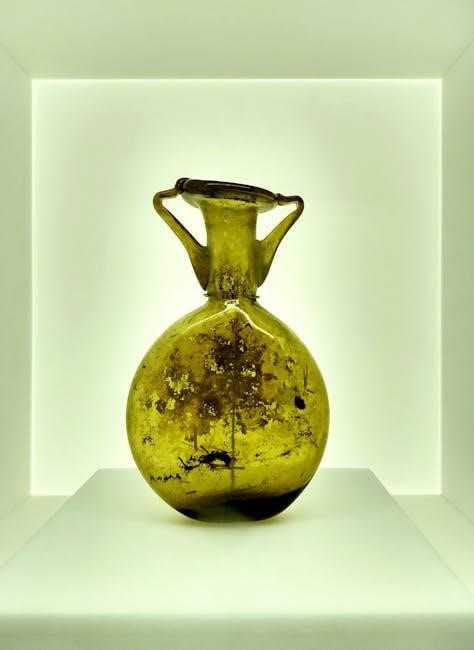
history of the world in six glasses pdf
Exploring how six beverages—beer, wine, spirits, coffee, tea, and cola—shaped human history, this book reveals their profound impact on culture, technology, and societal development across centuries.
Overview of “A History of the World in Six Glasses”
Tom Standage’s book, A History of the World in Six Glasses, offers a unique perspective on world history by tracing the influence of six pivotal beverages: beer, wine, spirits, coffee, tea, and cola. Each drink represents a distinct era, shaping cultural, technological, and societal developments. From the origins of beer in ancient Mesopotamia to the global dominance of cola in modern times, these beverages have played roles far beyond mere sustenance. They have driven advancements, fostered cultural exchange, and even fueled empires. The book seamlessly intertwines historical narratives with the stories of these drinks, demonstrating how they have been integral to human progress. Standage’s engaging approach provides a fresh lens through which to view the complexities of global history, making the book both informative and accessible to a wide audience. By focusing on these six glasses, the author reveals the profound and often surprising ways in which drinks have shaped our world.

The Six Beverages That Shaped World History
Beer, wine, spirits, coffee, tea, and cola each represent distinct eras, influencing culture, technology, and society. Together, they reveal how drinks have shaped human progress and global interconnectedness throughout history.
Beer: The Dawn of Civilization
Beer played a pivotal role in the rise of civilization, particularly in ancient Mesopotamia and Egypt. Its discovery is linked to the shift from nomadic to agricultural lifestyles, fostering the development of settled communities. The need to produce and store beer led to advancements in agriculture, as barley and wheat became essential crops. Additionally, the process of fermentation introduced early concepts of chemistry and technology. Beer also served as a social and cultural unifier, used in religious rituals, trade, and as a form of currency. Its importance extended beyond nutrition, contributing to the establishment of social hierarchies and governance systems. In essence, beer was not just a drink but a cornerstone of early civilization, driving technological innovation and societal organization. Its legacy remains as a testament to how a simple beverage could shape the course of human history.
Wine: The Drink of the Gods in Ancient Greece and Rome
Wine held a sacred and central role in ancient Greek and Roman cultures, often referred to as “the drink of the gods.” In Greece, it was closely associated with Dionysus, the god of wine, festivals, and ecstasy. Wine was not only a staple in daily life but also a symbol of wealth, status, and intellectual pursuits. The Greeks used wine in religious rituals and as a social lubricant during symposia, where it fueled philosophical debates and artistic performances. The Romans later adopted winemaking techniques and expanded viticulture across their empire, making wine a cornerstone of their diet and culture. Wine was also used for medicinal purposes and as a form of currency in trade. Its influence extended beyond consumption, shaping art, literature, and social norms. The legacy of wine in these civilizations underscores its enduring impact on Western culture and identity.
Spirits: The Age of Exploration and Colonization
Spirits, particularly rum and brandy, played a pivotal role during the Age of Exploration and colonization. These potent beverages served as currency in trade, facilitated the transatlantic slave trade, and lubricated diplomatic relations between colonizers and indigenous populations. European powers used spirits to establish control over new territories, often exploiting local populations through alcohol. The production of rum, for instance, was deeply tied to the sugar plantations of the Caribbean, which relied on enslaved labor. Spirits also became a symbol of European dominance, as they were often used to negotiate treaties or pacify resistance. However, the widespread consumption of spirits also led to social and health issues, both among colonizers and indigenous peoples. This period marked the global spread of distilled beverages, forever altering cultural and economic landscapes. Spirits thus became a double-edged sword, driving both the expansion of empires and the exploitation that accompanied it.

Coffee: The Spark of the Enlightenment

Coffee emerged as a transformative beverage during the Enlightenment, fueling intellectual and cultural revolutions across Europe. Its origins in the Middle East spread rapidly, and by the 17th century, coffeehouses became vibrant hubs for thinkers, scientists, and philosophers. These gathering places fostered open debate, challenging traditional authority and promoting rational discourse. Figures like Voltaire and Isaac Newton frequented coffeehouses, where ideas about democracy, science, and human rights flourished. Coffee’s stimulating effects encouraged clarity of thought, contrasting sharply with the haze of alcohol that dominated earlier social interactions. The rise of coffee culture also democratized access to knowledge, as people from diverse backgrounds engaged in discussions. This era marked a shift from communal drinking of beer and wine to individualized consumption of coffee, reflecting the growing emphasis on personal identity and intellectual pursuits. Coffee’s influence extended beyond Europe, shaping global trade networks and cultural exchanges that continue to resonate today.

Tea: The Fuel of the British Empire
Tea played a pivotal role in the rise and dominance of the British Empire, becoming a cornerstone of British culture and economy. Originating in China, tea was introduced to Britain in the 17th century and quickly gained popularity, evolving into a national obsession. The British East India Company monopolized the tea trade, establishing Britain as a global power. Tea plantations in India and Ceylon further solidified Britain’s control over the industry, while the opium wars with China were partly driven by the desire to secure tea supplies. Tea became integral to British daily life, with traditions like afternoon tea symbolizing social cohesion. Its influence extended beyond consumption, shaping trade routes and imperial policies. Tea also fueled technological advancements, such as the development of faster ships for tea transport. As the empire expanded, tea spread globally, embedding itself in diverse cultures. Today, tea remains a testament to the interconnectedness of history, culture, and globalization.
Cola: The Rise of Globalization
Cola, particularly Coca-Cola, represents the modern era of globalization, symbolizing the spread of American culture and corporate dominance worldwide. Invented in the late 19th century, cola quickly became a popular drink in the United States before expanding globally. Its rise coincided with the growth of international trade, advertising, and consumer culture. Coca-Cola’s innovative marketing strategies and global distribution networks made it a symbol of American influence. The beverage adapted to local tastes, creating variants like Diet Coke and Cherry Coke, while also influencing food pairings and social habits. Cola’s global presence reflects the interconnectedness of economies and cultures, often criticized for promoting cultural homogenization. Despite controversies over health impacts and market dominance, cola remains a powerful symbol of globalization, illustrating how a simple drink can shape modern society and commerce. Its enduring popularity underscores the interplay between business, culture, and technology in the contemporary world.
The Intersection of Culture and Technology

The six beverages symbolize the symbiotic relationship between culture and technology, driving innovations such as fermentation, trade routes, and mass production, which significantly shaped societal advancements throughout history.
The Role of Beverages in Technological Advancements
Beverages have played a pivotal role in driving technological progress throughout history. The discovery of beer, for instance, spurred advancements in agriculture and fermentation techniques, laying the groundwork for settled civilizations. Wine production in ancient Greece and Rome refined viticulture and fermentation methods, while spirits during the Age of Exploration fueled distillation technologies. Coffee and tea, with their global trade networks, inspired innovations in transportation and commerce. Even cola, a product of industrialization, relied on advanced manufacturing and bottling techniques. Each beverage not only reflected the technological capabilities of its era but also pushed the boundaries of what was possible, illustrating how drink production and consumption have consistently driven human ingenuity and innovation. These advancements, in turn, shaped cultural and economic landscapes, creating a lasting legacy in world history.
Cultural Exchange Through Drinks

Drinks have long served as bridges for cultural exchange, facilitating the flow of ideas, traditions, and values across civilizations. Beer, for instance, was central to ancient Mesopotamian and Egyptian societies, fostering communal gatherings and religious rituals that shaped early cultural practices. Wine in ancient Greece and Rome became a symbol of sophistication, influencing art, philosophy, and social customs. Spirits, particularly rum and whiskey, played a key role in global trade during the Age of Exploration, connecting Europe, Africa, and the Americas through complex networks. Coffee and tea further accelerated cultural exchange, with coffeehouses emerging as hubs for intellectual discourse in the Middle East and Europe, while tea bridged East and West through trade routes like the Silk Road. Cola, as a modern global phenomenon, represents the fusion of cultures in an increasingly interconnected world. Through these beverages, diverse cultures have intersected, enriching each other and leaving a lasting imprint on global heritage.

The Legacy of the Six Glasses
From beer to cola, these six drinks have left a lasting impact on culture, economy, and innovation, shaping modern traditions and industries while remaining central to social and cultural life today.

How These Beverages Continue to Influence Modern Society
Coffee remains a cornerstone of modern culture, fueling daily routines and fostering social connections in cafes worldwide. Tea continues to dominate global markets, with its production and trade shaping economies, particularly in regions like Britain and India. Spirits, such as whiskey and rum, remain popular in cocktails, reflecting their enduring legacy in entertainment and social gatherings. Beer, with its rich history, is now a staple in global cuisine, from traditional brews to craft microbreweries. Wine, celebrated for its culinary and cultural significance, influences modern gastronomy and health trends. Finally, cola, a symbol of globalization, continues to dominate the beverage industry, shaping consumer culture and marketing practices. These six drinks not only reflect the past but also actively shape contemporary society, proving their timeless relevance in culture, economy, and innovation.
Six drinks—beer, wine, spirits, coffee, tea, and cola—have profoundly shaped human history, influencing culture, technology, and society in ways that endure to this day.
The Enduring Impact of Six Drinks on World History
From ancient civilizations to modern times, six beverages—beer, wine, spirits, coffee, tea, and cola—have left an indelible mark on human history. Each drink represents a distinct era, shaping culture, trade, and technology in profound ways. Beer, for instance, laid the foundation for settled agriculture, while wine influenced the rise of classical civilizations. Spirits fueled exploration and colonization, coffee sparked enlightenment and revolution, tea powered the British Empire, and cola symbolized globalization. These drinks not only quenched thirst but also facilitated cultural exchange, technological advancements, and economic shifts. Their stories reveal how simple beverages can reflect broader societal transformations. Today, their legacy endures, as they continue to influence modern society, embodying the interconnectedness of human history and culture. By examining these six drinks, we gain a unique perspective on how everyday items can shape the course of civilization.